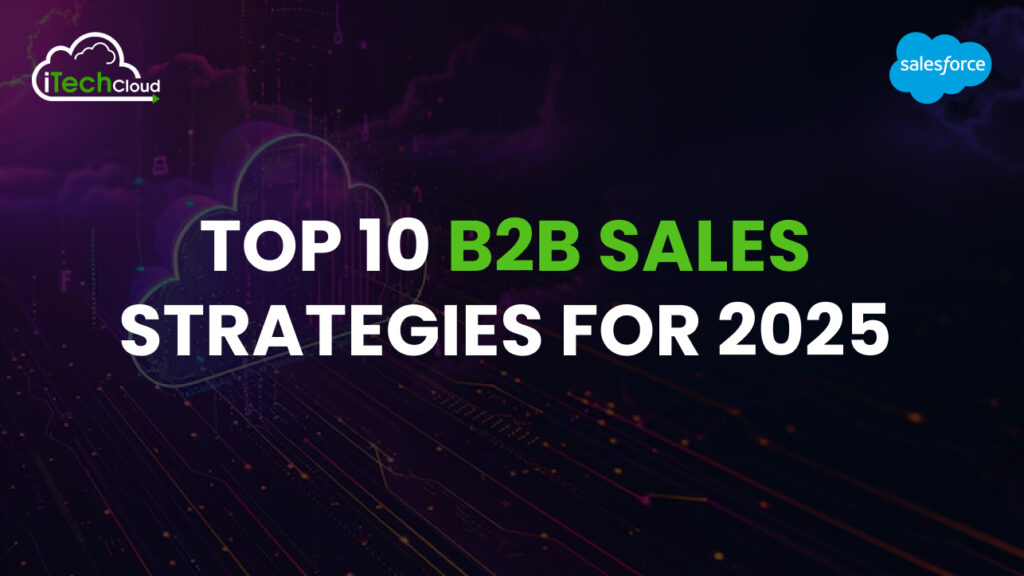Top 10 B2B Sales Strategies for 2025

B2B sales are evolving rapidly with technology, changing buyer behaviors, and increasing competition. In 2025, businesses must adopt modern strategies to stay ahead.
Table of Contents
Here are the top 10 B2B sales strategies that will drive success in the 2025.
1. Personalized Outreach with AI
Artificial Intelligence (AI) is revolutionizing B2B sales by enabling highly personalized outreach. AI-driven insights allow sales teams to analyze customer data, predict buying behavior, and create tailored messages that resonate with prospects. AI-powered chatbots and virtual assistants also enhance customer interactions by providing instant responses and personalized recommendations. Leveraging AI in outreach ensures higher engagement and better conversion rates.
2. Account-Based Marketing (ABM)
Account-Based Marketing (ABM) focuses on targeting high-value accounts with customized content and campaigns. Instead of a broad approach, ABM tailors messaging and solutions to specific businesses, increasing the chances of conversion. Sales and marketing teams collaborate to create personalized experiences, using data analytics to identify and prioritize key accounts. This strategy results in stronger relationships and improved ROI.
3. Social Selling & LinkedIn Optimization
LinkedIn has become a powerhouse for B2B networking and sales. Social selling involves leveraging LinkedIn and other social media platforms to build relationships, establish credibility, and engage potential clients. Sales teams optimize their LinkedIn profiles, share valuable content, participate in discussions, and connect with decision-makers. Engaging in meaningful conversations and providing value before making a sales pitch increases trust and improves lead generation.
4. Video Sales & Interactive Demos
Traditional sales pitches are becoming less effective, and businesses are turning to video and interactive demonstrations. Personalized video messages help create a human connection with prospects, making outreach more engaging. Live product demos, webinars, and virtual tours allow potential clients to experience a product or service in action. Interactive demos help in addressing queries in real-time, leading to quicker decision-making and higher conversion rates.
5. Data-Driven Decision Making
Data analytics play a crucial role in modern B2B sales. Sales teams use data-driven insights to understand customer behavior, optimize sales strategies, and identify potential leads. Analyzing past interactions, purchasing patterns, and engagement metrics helps in crafting personalized sales approaches. Predictive analytics also enable sales teams to anticipate customer needs and offer relevant solutions, ultimately improving the sales process and customer satisfaction.
6. Omnichannel Engagement
B2B buyers interact with businesses through multiple touchpoints, including email, social media, chatbots, phone calls, and webinars. An omnichannel sales strategy ensures a seamless and consistent experience across all these platforms. Providing multiple engagement options allows prospects to connect on their preferred channel, leading to improved customer satisfaction and better conversion rates. Integrating all communication channels also helps in tracking customer interactions and providing a unified sales approach.
7. Sales & Marketing Alignment
Collaboration between sales and marketing teams is essential for a successful B2B sales strategy. When both teams work together, they create a seamless customer journey, from lead generation to conversion. Marketing provides valuable insights and content that support the sales team’s efforts, while sales teams share feedback on customer pain points and preferences. Aligning goals, sharing data, and maintaining consistent messaging ensures a cohesive approach, ultimately driving better results.
8. Customer-Centric Selling
Modern buyers expect a consultative approach rather than a hard sales pitch. Customer-centric selling focuses on understanding the client’s pain points, challenges, and business goals. Instead of pushing a product, sales professionals act as advisors, offering tailored solutions that address specific needs. This approach builds trust and long-term relationships, leading to higher customer retention and increased sales.
9. Leveraging Automation & CRM Tools
Sales automation tools and Customer Relationship Management (CRM) systems streamline processes, making sales teams more efficient. Automation helps in managing follow-ups, tracking leads, scheduling meetings, and sending personalized emails. CRM systems provide valuable insights into customer interactions, helping sales teams prioritize leads and tailor their approaches. By leveraging these tools, businesses can enhance productivity, improve lead nurturing, and close deals faster.
10. Continuous Training & Adaptation
The B2B sales landscape is constantly evolving, making continuous learning and adaptation essential for sales success. Regular training on new tools, industry trends, and customer behavior helps sales teams stay ahead. Encouraging adaptability ensures that sales professionals can quickly adjust to changing market conditions and buyer expectations. Investing in professional development programs, workshops, and certifications enhances the team’s skills and drives better sales performance.
Conclusion
B2B sales in 2025 demand a modern, tech-driven approach that focuses on personalization, data, and customer-centric strategies. Businesses that adopt AI-driven outreach, ABM, social selling, video engagement, and omnichannel communication will have a competitive edge. Aligning sales and marketing efforts, leveraging automation, and continuously training sales teams will further enhance success.

